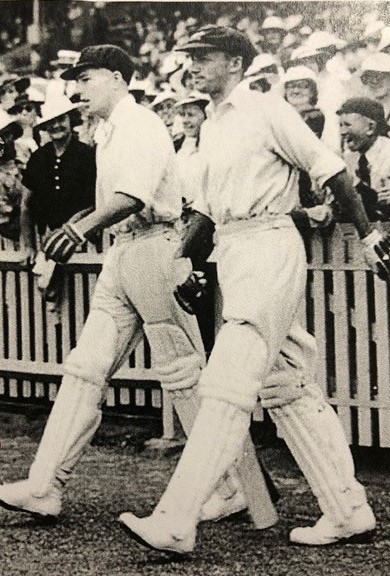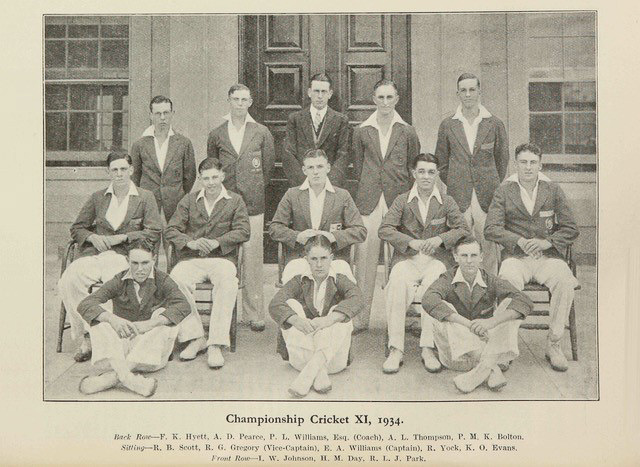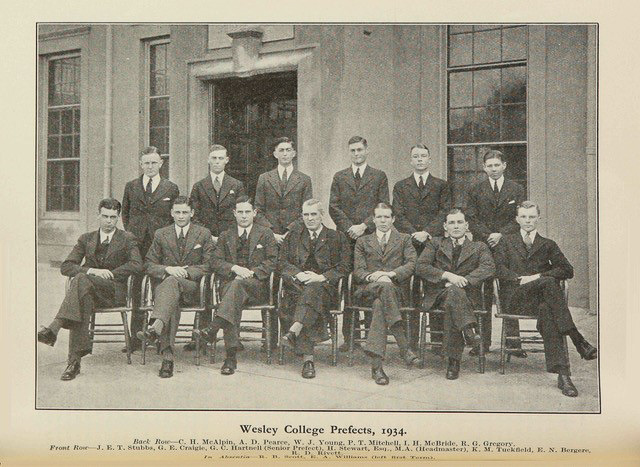<< Back to Lion homepage
OWCA
A Legend on and off the field – The story of Ross Gregory (OW1934)

Ross Gregory (OW1934) is one of the dozen or so OWs to have played Test cricket for Australia. Without doubt, he is one of the finest sportspersons to have attended Wesley College. Of short stature, he was not only a gifted right-hand batsman and a handy leg spinner, but also a capable footballer and tennis player.
He arrived at Wesley in 1931 from Gardenvale State School just about to turn 15 years old. Under the coaching of legendary teacher PL Williams, he played for four years in the First XI. In his last two years, 1933 and 1934, the First XI was the Champion APS team, being undefeated in all ten matches in those years. Ross scored 978 runs (average 40) and took 81 wickets (average 17). He first represented Victoria in February 1934 having commenced his final year at Wesley.

Remarkably, in early 1937 at the age of 20 he played two Ashes Tests against England in Melbourne and Adelaide under the captaincy of Don Bradman. Also in those two teams was batter Keith Rigg MBE (OW1924) who played eight Tests, his last one being the 1937 Melbourne Test.
Ross batted three times, scoring a combined total of 153 runs. He reached a half-century in two of those innings, with his highest score of 80 recorded in his final test innings, helping Australia to retain The Ashes. In the second innings of the Adelaide Test, his 50 runs contributed to a 135-run partnership with Bradman. This set up a sizable run chase that the English team could not achieve in their second innings.
His performance captured the attention of the cricket world. Cartoonists drew him as the ‘baby’, and one newspaper writer described him as a ‘champion in the making.’ While the focus was on his batting, his bowling should not be forgotten. In the final Shield match of 1937, Ross dismissed Bradman twice (for 54 and 35 runs respectively).
He was considered highly unfortunate not to be selected in the 1938 Ashes team that toured England. He continued to play cricket for Victoria and his local Club, St Kilda, until he joined the RAAF in August 1940. After training in Australia, he arrived in England in July 1941 and was posted to an RAF base on Scotland’s north coast to learn how to navigate the Wellington bomber. In November, he was assigned to the RAF 99 Squadron and subsequently participated in four missions over Europe.
In late February 1942, he was transferred to the RAF 215 Squadron and sent with that unit to India via Cairo. The squadron’s mission was to support British troops in operations against the invading Japanese Army in Burma. On 10 June 1942, age 26, he was the observer on a Wellington B514 that was destroyed by an explosion and crashed about 90 kilometres north of Dhaka, the capital of Bangladesh. Whether the explosion was caused by enemy fire or bad weather is uncertain.
The remains of the six crew members were buried by the local police. Flood waters from the Brahmaputra River subsequently covered the graves and despite a search at the end of the war, no trace of the graves could be found. His name is recorded on the Commonwealth War Grave Commission’s Singapore Memorial.
His death was a major news items and two memorial services were held. It was a huge tragedy for his parents (he was an only child) and his fiancée.
His dismissal in his sole Melbourne Test innings has been claimed as the most tragic in Test cricket as the bowler (Farnes), the catcher (Verity) and the dismissed batsman (Gregory) would all die in the war. Ross is the only Australian Test Cricketer to have lost his life on active service in WWII.
In his first-class career comprising 33 appearances, he scored 1,874 runs at an average of 38.24, with 17 half-centuries and a hundred against the MCC team in 1937. As a leg-spin bowler, he took 50 wickets at an average of 35.34.
A notable feature of Ross was his personality. After his death, PL Williams wrote, “Above all, he was proving himself early a gentleman in all things. One sought in vain for flaws in his character. He had a natural courtesy, kindliness and friendliness towards all, and with the blessed advantage of a fine home training, he had marked out for himself a line of gentlemanly conduct which he followed unswervingly.”
Sam Loxton OBE (OW1938), a member of the 1948 ‘Invincibles’ is quoted as saying: ‘Ross Gregory was a hero to us all.’
Ross Gregory’s name is remembered in the sport oval and road that takes his name at Albert Park Lake.
In this, the 80th year since his death, we remember him as an example of the OWs who served their country in a time of peril, and by not returning safely to his family, was denied the opportunity to enjoy a long life full of promise.
Perhaps the last word about him can be attributed to cricket legend, Keith Miller who said, ‘I would love to have been like him!’

Contributed by Philip Powell (OW1973), author, historian, former Vice President of Council and regular contributor to Lion magazine, who acknowledges David Frith and his excellent book, ‘The Ross Gregory Story’.